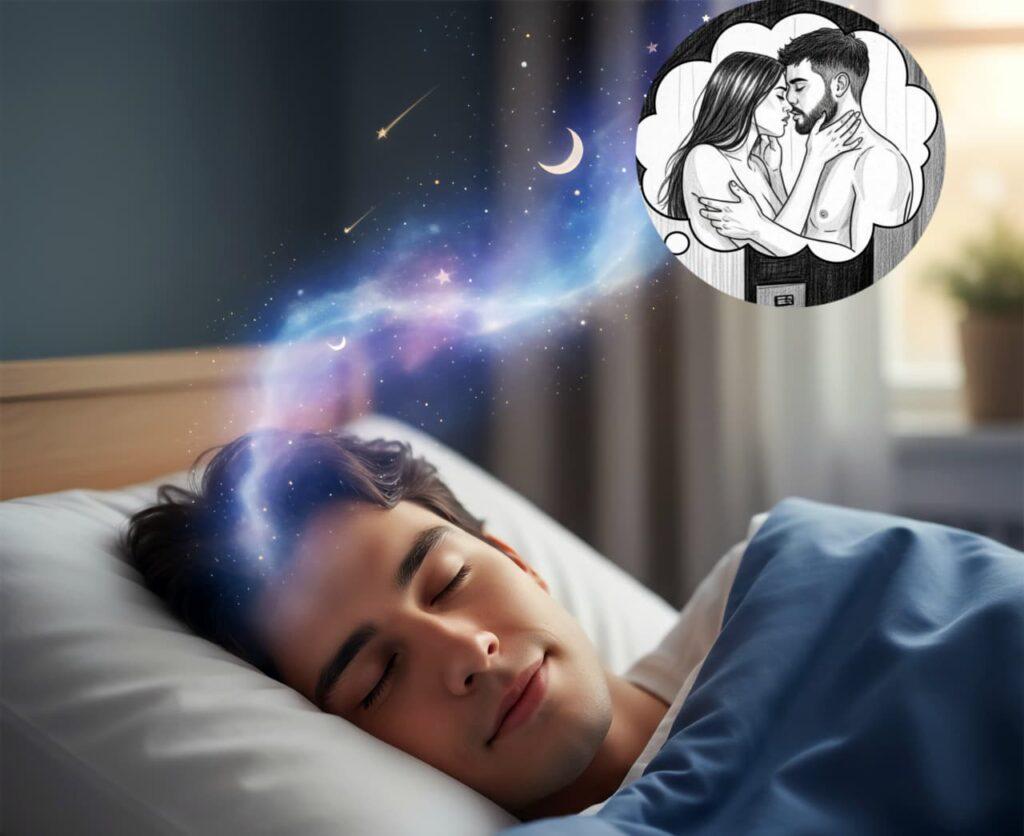
Nocturnal Emission (Wet Dreams)
What Is the Meaning of Nocturnal Emission?
Nocturnal emission, also called a wet dream, is the involuntary release of semen during sleep.
It occurs when the body naturally releases built-up sexual energy through erotic dreams or subconscious stimulation. This is a normal and healthy process that often begins in adolescence.
Why Does Nocturnal Emission Happen?
Wet dreams are part of the body’s natural reproductive balance. They can happen due to:
Hormonal fluctuations (especially increased testosterone)
Erotic dreams or fantasies
Long abstinence from sexual activity
Psychological stress or poor sleep patterns
Does Everyone Experience It?
Not everyone experiences nocturnal emissions, but many males do. Frequency varies depending on age, lifestyle, hormones, and emotional state.
Some may never have them, while others may experience them regularly — both are within the range of normal.
Is It Normal?
Yes — nocturnal emission is completely normal. It shows that the reproductive organs are healthy and functioning properly. It does not indicate disease, weakness, or lack of control.
How Much Is Considered Normal?
Most men experience 1–4 wet dreams per month, though this number may vary. What matters is how it affects energy, sleep, or mood — not the number itself.
How Much Is Too Much?
If wet dreams occur several times per week, disturb sleep, or cause fatigue, anxiety, or physical weakness, it may be considered excessive.
Such cases benefit from medical evaluation to rule out stress, anxiety, or hormonal imbalance.
Diet and Lifestyle: What Helps?
Ayurveda’s View
In Ayurveda, excessive nocturnal emission results from an imbalance of Pitta and Vata doshas.
Ayurvedic suggestions include:
Avoid spicy, oily, and fried foods
Eat cooling foods like milk, ghee, dates, and almonds
Sleep early and practice meditation
Maintain mental purity and self-discipline (Brahmacharya)
Unani Medicine’s Perspective
In Unani medicine, nocturnal emission (Ihtilam) occurs due to excess body heat or weakness of seminal retention.
Recommended practices:
Eat balanced, nutrient-rich meals
Include cooling fruits like pomegranate and melon
Strengthen reproductive energy with natural tonics and rest
Traditional Chinese Medicine (TCM) View
According to Chinese Medicine, frequent wet dreams reflect Kidney Yin deficiency or Heart–Kidney disharmony.
TCM advice:
Reduce mental stress and late-night stimulation
Avoid excessive sexual activity
Consume kidney-nourishing foods like walnuts, black sesame, and goji berries
Is Constipation a Reason?
Yes. Chronic constipation can put pressure on pelvic nerves and the prostate, increasing the risk of involuntary emission during sleep. Maintaining a fiber-rich diet and regular bowel movement helps reduce this risk.
Effects of Excessive Wet Dreams
Occasional nocturnal emissions are harmless. But frequent episodes may lead to:
Fatigue or low energy
Mild anxiety or guilt
Reduced sexual desire
Premature ejaculation or weak erections (rare)
In most cases, these issues are temporary and psychological. A calm mind, good sleep, and balanced nutrition usually restore harmony.
When Should You Consult a Doctor?
Seek professional help from a sexologist, or holistic medicine practitioner if:
Wet dreams occur too frequently and affect daily life
There is pain, burning, or unusual discharge
You experience loss of libido, stress, or insomnia
Final Thoughts
Nocturnal emission is a natural and self-regulating function of the body. Ayurveda, Unani, and Chinese Medicine all view it as a sign of imbalance in energy flow, best managed through proper diet, rest, and emotional stability. If it becomes excessive, medical or holistic guidance can help restore equilibrium and confidence.
FAQ on Nocturnal Emission
1. Is nocturnal emission harmful?
No. It’s a natural physiological event. It only becomes concerning if it occurs very frequently or causes physical or emotional distress.
2. Can diet control wet dreams?
Yes. Cooling, nutritious, and balanced foods — like milk, fruits, nuts, and whole grains — help stabilize hormones and calm the mind. Avoiding spicy, fried, and stimulating foods can reduce frequency.
3. Does stress increase wet dreams?
Yes. Anxiety, lack of sleep, and mental overactivity often increase nocturnal emissions. Meditation, yoga, and good sleep hygiene help reduce them.
4. Can constipation cause nocturnal emission?
In some cases, yes. Constipation puts pressure on pelvic organs, potentially increasing the chance of involuntary emission during sleep.
5. When should I consult a doctor?
If you experience very frequent wet dreams, weakness, or emotional distress, or if symptoms like pain or burning appear, consult a qualified sexual health or Ayurvedic practitioner.
Our Clinic Address
Kozhikode: Dr. Roy Medical Hall, Jaffer Khan Colony, Opposite Planetarium, (Behind Al Hind Tours & Travels) Kozhikode – 673006, Kerala, India. Mobile: +91 9349113791
Thrissur: Alfa Health Centre, Near ESI Hospital, L-Lane, Gandhi Nagar, Olarikara, Thrissur – 680012, Kerala, India. Mobile: +91 9747698920
Coimbatore: Alfa Health Centre, No 11/83, 1st floor, Gee Gee Complex, Vivekananda Rd, Ram Nagar, Coimbatore, Tamil Nadu 641009 Mobile: +91 9747698920
Bangalore: Roy Health Clinic, Prabhat Complex, Kempegowda Rd, Anchepet, Chickpet, Bengaluru, Karnataka 560009. Mobile: +91 9739208007
Consultation Hours: Monday to Saturday, 11:30 AM to 6:00 PM. Closed on Sunday.
